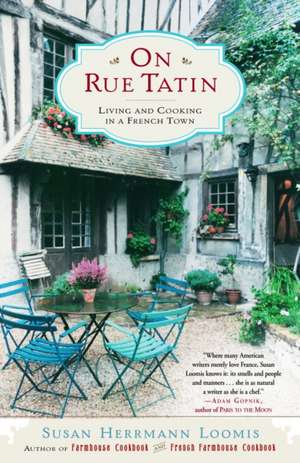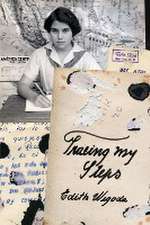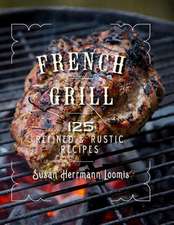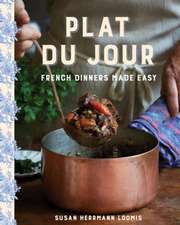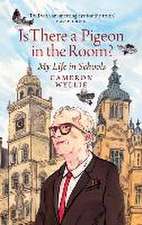On Rue Tatin: Living and Cooking in a French Town
Autor Susan Herrmann Loomisen Limba Engleză Paperback – 31 mar 2002
Vezi toate premiile Carte premiată
IACP Crystal Whisk Award (2002)
began then as an apprenticeship at La Varenne École de Cuisine evolved into a lifelong immersion in French cuisine and culture, culminating in permanent residency in 1994. On Rue Tatin chronicles her journey to an ancient little street in Louviers, one of Normandy’s most picturesque towns.
With lyrical prose and wry candor, Loomis recalls the miraculous restoration that she and her husband performed on the dilapidated convent they chose for their new residence. As its ochre and azure floor tiles emerged, challenges outside the dwelling mounted. From squatters to a surly priest next door, along with a close-knit community wary of outsiders, Loomis tackled the social challenges head-on, through persistent dialogue–and baking.
On Rue Tatin includes delicious recipes that evoke the essence of this region, such as Apple and Thyme Tart, Duck Breast with Cider, and Braised Chicken in White Wine and Mustard. Transporting readers to a world where tradition is cherished, On Rue Tatin provides a touching glimpse of the camaraderie, exquisite food, and simple pleasures of daily life in a truly glorious corner of Normandy.
| Toate formatele și edițiile | Preț | Express |
|---|---|---|
| Paperback (2) | 83.19 lei 3-5 săpt. | +14.10 lei 10-14 zile |
| HarperCollins Publishers – 4 iun 2002 | 83.19 lei 3-5 săpt. | +14.10 lei 10-14 zile |
| BROADWAY BOOKS – 31 mar 2002 | 113.56 lei 3-5 săpt. |
Preț: 113.56 lei
Nou
Puncte Express: 170
Preț estimativ în valută:
21.73€ • 22.75$ • 17.98£
21.73€ • 22.75$ • 17.98£
Carte disponibilă
Livrare economică 15-29 martie
Preluare comenzi: 021 569.72.76
Specificații
ISBN-13: 9780767904551
ISBN-10: 0767904559
Pagini: 320
Dimensiuni: 136 x 203 x 18 mm
Greutate: 0.27 kg
Editura: BROADWAY BOOKS
ISBN-10: 0767904559
Pagini: 320
Dimensiuni: 136 x 203 x 18 mm
Greutate: 0.27 kg
Editura: BROADWAY BOOKS
Notă biografică
SUSAN HERRMANN LOOMIS, the author of five cookbooks, is a regular contributor to publications such as the New York Times and Gourmet. She owns and operates On Rue Tatin, a cooking school. For more information about the school, consult www.onruetatin.com.
Extras
One
The Beginning
The story of our adventure, our move to Rue Tatin, began some thirteen years earlier, when I first went to live in Paris. Of course back then I had no idea that I would fall hopelessly in love with Michael Loomis, and then with France. Nor did I ever imagine longing so heartily for the French countryside, the French language, the thousands of things that make French life what it is, from dozens of varieties of bottled water to the sweet cream butter. There wasn't any way to know then how deeply and irreversibly seduced I would be by the markets, the restaurants, the French lifestyle that takes its cue from the meal and the table.
The suitcase was big, and it was heavy. It had everything I thought I would need for a year in Paris, including a little wire contraption that worked on 220 currents and would boil water instantly, my favorite earthenware Melitta coffee maker, and a Le Petit Robert Dictionnaire de la Langue Francaise French dictionary, the best I could find.
After months of planning, applying for and getting a student loan, packing, and moving, I was finally in Paris for a year's experience as a stagiaire, or apprentice, at a cooking school for English-speaking students. It sounded like a dream--working all day at the school, taking cooking classes at night with French chefs, and living in Paris to boot. I was beside myself with excitement. And fear. I didn't know a soul. I'd only been to Paris once before, for a short week when I was barely twenty. I'd studied French for years in school but had never really spoken it.
Already concerned about just how I was going to make the $2,500 loan I'd gotten stretch for a year, I decided on arrival to take the metro rather than a cab from the airport to the city. That meant heaving the suitcase up and down stairs, through archaic turnstiles (all of which have been modernized since to accommodate luggage), in and out of metro cars. It was several very rough hours before I arrived at the apartment where I was to stay with a young woman who had just started working at the cooking school and had offered me her spare bedroom. The apartment was in the ninth arrondissement, not far from Montmartre. I would stay there just long enough to find a place of my own.
No one was at the apartment and I was in a hurry. I dropped my bags, took a deep breath, and immediately ran back out the door to renegotiate the metro and report for work.
The apprenticeship was set out in six-week stages, the first being that of school receptionist, which meant sitting behind a desk, answering the phone, greeting visitors, and dealing with mounds of paperwork. My ideas of a romantic, food-filled year hadn't included such stultifying work; the only thing that kept me going was peeking at the cooking classes going on in the adjacent room and knowing that two nights a week I would join the other stagiaires for cooking classes.
I could hardly wait for the first class. When my workday was finished and the door to the street locked, I followed the other stagiaires to the kitchen. They explained the system to me, which sounded too good to be true. There was a list of perhaps a hundred required recipes to work through during the year, calculated to teach the basics of classic French cuisine and to prepare us for the year-end exam. All we had to do before each class was to choose the recipes we wanted to work on, in a certain order that went from simple to complex. All of the ingredients would be ordered so that on the night of the class we simply had to run downstairs to the cave, or cellar, where they were kept, and bring them upstairs. We paired up to work and kept the same partners throughout the year, to the extent everyone's staggered schedule would allow.
Once I had traded my phone and typewriter for a chef's knife and covered my street clothes with a long white apron, I was in heaven. Hours to cook, good company to cook with, fabulous ingredients. Never had I imagined produce so gorgeous, so intense in both appearance and flavor. Though my culinary education was relatively broad--I lived in England and Germany while growing up and had a mother who was endlessly creative in the kitchen and rarely made the same dish twice--it was not sophisticated.
My personal interest in cooking had come rather late in life. It wasn't until I was in my last year of high school when both of my sisters, who seemed to spend hours in the kitchen baking cookies, were out of the house that I realized I had a passion for cooking. That year and all through college I cooked whenever I had free time. When I wasn't cooking I was reading about it, planning my next meal, designing my next dinner party. After earning a degree in communications and working at newspapers and in public relations, it dawned on me I could incorporate food into my professional life, which is what had led me to La Varenne. I wanted to be a food writer, but first I had to learn how to cook.
So here I was in 1980 in a two-hundred-year-old building in Paris, near the Place des Invalides, basking in the world's best butter; the fattest, most pungent pink garlic; spinach whose leaves were so firm and meaty they stood up on the table instead of lying flat; brown eggs whose yellow yolks tasted as rich as they looked. I thought I knew good apples, fragrant strawberries, juicy pears. But never had I tasted the likes of the fraises des bois I had on a tart at La Varenne, and the pears I sniffed made me want to fold them into cakes, slather them with chocolate, poach them in fragrant herbs and spices.
The food was so whole. Chickens came with head, feet, and pinfeathers, and so did the pigeons and quail; the fish looked at me with big, dreamy eyes as I took them from the cooler; the lettuce still had soil clinging to it.
Once my onerous receptionist stint was finished I moved on to washing dishes at cooking demonstrations, a job I much preferred. At least I was in contact with food. I lived in a blessed cloud of ecstasy about the food, the flavors, the techniques I was learning. I jumped at the chance to run errands to the market, the cheese shop, the bakery. When I wasn't at La Varenne I took jobs cooking for embassy families, catering bar mitzvahs, making canapes for special occasions. Anything to be with food. Whenever I could I went to spend a day at a bakery or patisserie, often getting up at 1 a.m. and arriving when the baker did, so I missed nothing and could still get to work on time.
The chefs on duty with us for our evening classes--all of them terribly handsome in their crisp whites and with their Gallic attitudes--would yell, scream, cajole, flirt, pinch, and generally try to pummel us into cooks of some merit. After several hours of cooking we would sit down late in the evening to sample and critique our creations. I always raced through whatever my required dish or dishes were so that I could jump ahead and make something else from the list, usually in the dessert category. I always toyed with these extra recipes, embellishing and transforming them by adding ground walnuts to a gateau Breton, for instance, and pate sable to a chocolate charlotte. It was more fun than I could have imagined.
Being a stagiaire at La Varenne was a unique experience, not always easy but invaluable, a sort of boot camp for cooks. All those long days doing the bidding of the chefs and the hours spent in the basement peeling garlic for a cooking demonstration, or in the office writing or rewriting something for one of the school's books that were produced there, were ideal training for the life of a freelance food writer.
I had expected, while doing my apprenticeship, to travel on weekends. Before arriving in France, I'd joined an organization called SERVAS, which is set up to further international goodwill by supplying travelers with names of host families in countries where they want to visit. The idea is that the traveler stays with the host family free of charge for up to three days and must, in exchange, be willing to participate in whatever the family is doing, be it harvesting grapes, taking care of children, or touring the countryside.
I looked through my list and found a family that wasn't too far out of Paris and called to see if I could come out the following weekend. They were busy but their daughter, who lived nearby, said a visit would be just fine. Early Saturday morning I climbed on a train at Gare St. Lazare and was on my way to my first weekend in the French countryside.
When I arrived at the train station in Normandy I was met by a tall, thin, harried-looking woman who drove me to her large stone house. We entered a huge courtyard with its sculpted privets and riotous dahlias and I saw the image of all I love in France. Solid and square with graceful proportions, it was a maison bourgeoise, its facade a parade of tall windows each hung with a different antique lace curtain. Geraniums and pansies spilled out of window boxes, an antique bicycle leaned against the wall, the wicker basket on its back fender overflowing with petunias.
She said something to me I didn't understand, pointed to her three chubby, gorgeous golden-haired children, and took off in the car. I was alone and the children immediately started fighting. I searched frantically for words like "be quiet" and "go to your room," but of course, nothing came out. I finally yelled "Arret." They stopped, looked at me with their big, wide eyes, and all started to giggle and point their fingers. I searched in the cupboards looking for something to give them to eat and found only one box of organic biscuits (I now remembered that the description of this family included "vegetarian"). What else had it included, I wondered, as I chased the children through the freezing, massive, stone-floored house.
My hostess finally returned, fed the children, giving each a heaping plate of steaming noodles with Gruyore cheese, and put them all to bed. They were crying, but she simply shut their doors and went downstairs. We had a quick lunch of the same pasta, with the most delicious green salad I'd ever tasted, then she indicated I follow her out to the garden. There we worked in almost complete silence, carrying wheelbarrow after wheelbarrow of soil, weeds, and stones from one part of the garden to the other. I was delighted, eking out bits of conversation as we worked.
I learned that the woman, Edith Leroy, who was just a few years older than I, and Bernard, her husband, had just bought the house. She was by profession a painter; Bernard had recently started his own company, and they were stretched very thin. The conversation was slow going. Edith didn't make eye contact, didn't talk much, and never smiled. I was in heaven. I had always heard the French were cold and somewhat austere. I found Edith's behavior gratifyingly exotic.
We worked for hours, then Edith got the kids, gave them a snack (those organic biscuits), piled them into the back of her green Deux Chevaux and indicated I get in beside her. She flew out of the driveway and we careened through the village and down a winding road to the next town, where she had an errand to run. She left the children with her parents--older, more austere versions of Edith--and off we went.
We ended up at an herboristerie, or herb store, that smelled like lavender, rosemary, and fresh thyme, and was so calm and peaceful I wanted to set up camp there. Edith bought bread, organic cookies, and a cajot, or crate, full of soil-covered carrots, leeks, potatoes, and cabbage, all organic, then we piled back into the Deux Chevaux, picked up the kids, and careened back home. The kids were flying around in the backseat screaming and hitting each other, themselves, the car seats. Edith was perfectly composed. I was a wreck, imagining an accident and a little sturdy ball of a child hurtling through the windshield. We arrived home safely, however, and the kids piled out of the car and went to play in the yard. Edith and I went into the house and she began to prepare dinner. It was about 7 p.m. An hour later her husband, Bernard, a stocky man with fine brown hair and large brown eyes, arrived. He set down his briefcase, shook my hand, and offered to give me a tour of the house. He spoke decent English, and we could understand each other perfectly. It was a huge relief. He showed me the small bathroom off the master bedroom upstairs with a pastoral mural painted on the walls, Edith's work. It was lovely, and freezing. "You may want to take a shower before dinner," he said, waving to the small bathtub which had a shower attachment. "I know Americans like to be very clean." Nothing in the world would have induced me to bathe--I could barely keep my teeth from clattering.
Bernard was the picture of civility, as calm and warm as Edith was tense and cool. I started to relax and almost immediately began to understand a bit of French. Edith fed the children and put them to bed, and sometime later the three of us sat down at a candlelit table in the kitchen next to the fireplace, the only warm spot in the house. Bernard explained that the house had an old coal furnace, which Edith had to fill several times a day. Even when full it didn't offer much comfort. Some day they would change it.
Edith had made a simple meal-carottes rapees, a mound of sarrasin (buckwheat groats), with a garlicky, lemony vinaigrette and braised leeks, a huge garden salad, a Camembert so creamy it melted in my mouth. Dessert was an apple clafoutis. I had felt close to starvation during the afternoon, accustomed as I'd become to my daily La Varenne snacks of baguette slathered with butter, and the edge of hunger made the meal taste even more delicious.
The following morning everyone rose early. Bernard was vice-mayor of the village, so he was off to some function. Edith had more plans to work in the garden. The children took care of themselves. I headed for the wheelbarrow, and together and in silence, Edith and I worked until lunchtime. We had soft-boiled eggs; I watched the children as they stuck little sticks of toasted, buttered bread (mouillettes) into their eggs, and did the same. I easily made my way through two eggs, the most delicious I'd ever tasted. I reveled in the intensely garlicky, tart salad, had more Camembert slathered on the hearty whole wheat bread Edith had bought the day before at the health food store, then enjoyed another clafoutis, this time with pears instead of apples.
The Beginning
The story of our adventure, our move to Rue Tatin, began some thirteen years earlier, when I first went to live in Paris. Of course back then I had no idea that I would fall hopelessly in love with Michael Loomis, and then with France. Nor did I ever imagine longing so heartily for the French countryside, the French language, the thousands of things that make French life what it is, from dozens of varieties of bottled water to the sweet cream butter. There wasn't any way to know then how deeply and irreversibly seduced I would be by the markets, the restaurants, the French lifestyle that takes its cue from the meal and the table.
The suitcase was big, and it was heavy. It had everything I thought I would need for a year in Paris, including a little wire contraption that worked on 220 currents and would boil water instantly, my favorite earthenware Melitta coffee maker, and a Le Petit Robert Dictionnaire de la Langue Francaise French dictionary, the best I could find.
After months of planning, applying for and getting a student loan, packing, and moving, I was finally in Paris for a year's experience as a stagiaire, or apprentice, at a cooking school for English-speaking students. It sounded like a dream--working all day at the school, taking cooking classes at night with French chefs, and living in Paris to boot. I was beside myself with excitement. And fear. I didn't know a soul. I'd only been to Paris once before, for a short week when I was barely twenty. I'd studied French for years in school but had never really spoken it.
Already concerned about just how I was going to make the $2,500 loan I'd gotten stretch for a year, I decided on arrival to take the metro rather than a cab from the airport to the city. That meant heaving the suitcase up and down stairs, through archaic turnstiles (all of which have been modernized since to accommodate luggage), in and out of metro cars. It was several very rough hours before I arrived at the apartment where I was to stay with a young woman who had just started working at the cooking school and had offered me her spare bedroom. The apartment was in the ninth arrondissement, not far from Montmartre. I would stay there just long enough to find a place of my own.
No one was at the apartment and I was in a hurry. I dropped my bags, took a deep breath, and immediately ran back out the door to renegotiate the metro and report for work.
The apprenticeship was set out in six-week stages, the first being that of school receptionist, which meant sitting behind a desk, answering the phone, greeting visitors, and dealing with mounds of paperwork. My ideas of a romantic, food-filled year hadn't included such stultifying work; the only thing that kept me going was peeking at the cooking classes going on in the adjacent room and knowing that two nights a week I would join the other stagiaires for cooking classes.
I could hardly wait for the first class. When my workday was finished and the door to the street locked, I followed the other stagiaires to the kitchen. They explained the system to me, which sounded too good to be true. There was a list of perhaps a hundred required recipes to work through during the year, calculated to teach the basics of classic French cuisine and to prepare us for the year-end exam. All we had to do before each class was to choose the recipes we wanted to work on, in a certain order that went from simple to complex. All of the ingredients would be ordered so that on the night of the class we simply had to run downstairs to the cave, or cellar, where they were kept, and bring them upstairs. We paired up to work and kept the same partners throughout the year, to the extent everyone's staggered schedule would allow.
Once I had traded my phone and typewriter for a chef's knife and covered my street clothes with a long white apron, I was in heaven. Hours to cook, good company to cook with, fabulous ingredients. Never had I imagined produce so gorgeous, so intense in both appearance and flavor. Though my culinary education was relatively broad--I lived in England and Germany while growing up and had a mother who was endlessly creative in the kitchen and rarely made the same dish twice--it was not sophisticated.
My personal interest in cooking had come rather late in life. It wasn't until I was in my last year of high school when both of my sisters, who seemed to spend hours in the kitchen baking cookies, were out of the house that I realized I had a passion for cooking. That year and all through college I cooked whenever I had free time. When I wasn't cooking I was reading about it, planning my next meal, designing my next dinner party. After earning a degree in communications and working at newspapers and in public relations, it dawned on me I could incorporate food into my professional life, which is what had led me to La Varenne. I wanted to be a food writer, but first I had to learn how to cook.
So here I was in 1980 in a two-hundred-year-old building in Paris, near the Place des Invalides, basking in the world's best butter; the fattest, most pungent pink garlic; spinach whose leaves were so firm and meaty they stood up on the table instead of lying flat; brown eggs whose yellow yolks tasted as rich as they looked. I thought I knew good apples, fragrant strawberries, juicy pears. But never had I tasted the likes of the fraises des bois I had on a tart at La Varenne, and the pears I sniffed made me want to fold them into cakes, slather them with chocolate, poach them in fragrant herbs and spices.
The food was so whole. Chickens came with head, feet, and pinfeathers, and so did the pigeons and quail; the fish looked at me with big, dreamy eyes as I took them from the cooler; the lettuce still had soil clinging to it.
Once my onerous receptionist stint was finished I moved on to washing dishes at cooking demonstrations, a job I much preferred. At least I was in contact with food. I lived in a blessed cloud of ecstasy about the food, the flavors, the techniques I was learning. I jumped at the chance to run errands to the market, the cheese shop, the bakery. When I wasn't at La Varenne I took jobs cooking for embassy families, catering bar mitzvahs, making canapes for special occasions. Anything to be with food. Whenever I could I went to spend a day at a bakery or patisserie, often getting up at 1 a.m. and arriving when the baker did, so I missed nothing and could still get to work on time.
The chefs on duty with us for our evening classes--all of them terribly handsome in their crisp whites and with their Gallic attitudes--would yell, scream, cajole, flirt, pinch, and generally try to pummel us into cooks of some merit. After several hours of cooking we would sit down late in the evening to sample and critique our creations. I always raced through whatever my required dish or dishes were so that I could jump ahead and make something else from the list, usually in the dessert category. I always toyed with these extra recipes, embellishing and transforming them by adding ground walnuts to a gateau Breton, for instance, and pate sable to a chocolate charlotte. It was more fun than I could have imagined.
Being a stagiaire at La Varenne was a unique experience, not always easy but invaluable, a sort of boot camp for cooks. All those long days doing the bidding of the chefs and the hours spent in the basement peeling garlic for a cooking demonstration, or in the office writing or rewriting something for one of the school's books that were produced there, were ideal training for the life of a freelance food writer.
I had expected, while doing my apprenticeship, to travel on weekends. Before arriving in France, I'd joined an organization called SERVAS, which is set up to further international goodwill by supplying travelers with names of host families in countries where they want to visit. The idea is that the traveler stays with the host family free of charge for up to three days and must, in exchange, be willing to participate in whatever the family is doing, be it harvesting grapes, taking care of children, or touring the countryside.
I looked through my list and found a family that wasn't too far out of Paris and called to see if I could come out the following weekend. They were busy but their daughter, who lived nearby, said a visit would be just fine. Early Saturday morning I climbed on a train at Gare St. Lazare and was on my way to my first weekend in the French countryside.
When I arrived at the train station in Normandy I was met by a tall, thin, harried-looking woman who drove me to her large stone house. We entered a huge courtyard with its sculpted privets and riotous dahlias and I saw the image of all I love in France. Solid and square with graceful proportions, it was a maison bourgeoise, its facade a parade of tall windows each hung with a different antique lace curtain. Geraniums and pansies spilled out of window boxes, an antique bicycle leaned against the wall, the wicker basket on its back fender overflowing with petunias.
She said something to me I didn't understand, pointed to her three chubby, gorgeous golden-haired children, and took off in the car. I was alone and the children immediately started fighting. I searched frantically for words like "be quiet" and "go to your room," but of course, nothing came out. I finally yelled "Arret." They stopped, looked at me with their big, wide eyes, and all started to giggle and point their fingers. I searched in the cupboards looking for something to give them to eat and found only one box of organic biscuits (I now remembered that the description of this family included "vegetarian"). What else had it included, I wondered, as I chased the children through the freezing, massive, stone-floored house.
My hostess finally returned, fed the children, giving each a heaping plate of steaming noodles with Gruyore cheese, and put them all to bed. They were crying, but she simply shut their doors and went downstairs. We had a quick lunch of the same pasta, with the most delicious green salad I'd ever tasted, then she indicated I follow her out to the garden. There we worked in almost complete silence, carrying wheelbarrow after wheelbarrow of soil, weeds, and stones from one part of the garden to the other. I was delighted, eking out bits of conversation as we worked.
I learned that the woman, Edith Leroy, who was just a few years older than I, and Bernard, her husband, had just bought the house. She was by profession a painter; Bernard had recently started his own company, and they were stretched very thin. The conversation was slow going. Edith didn't make eye contact, didn't talk much, and never smiled. I was in heaven. I had always heard the French were cold and somewhat austere. I found Edith's behavior gratifyingly exotic.
We worked for hours, then Edith got the kids, gave them a snack (those organic biscuits), piled them into the back of her green Deux Chevaux and indicated I get in beside her. She flew out of the driveway and we careened through the village and down a winding road to the next town, where she had an errand to run. She left the children with her parents--older, more austere versions of Edith--and off we went.
We ended up at an herboristerie, or herb store, that smelled like lavender, rosemary, and fresh thyme, and was so calm and peaceful I wanted to set up camp there. Edith bought bread, organic cookies, and a cajot, or crate, full of soil-covered carrots, leeks, potatoes, and cabbage, all organic, then we piled back into the Deux Chevaux, picked up the kids, and careened back home. The kids were flying around in the backseat screaming and hitting each other, themselves, the car seats. Edith was perfectly composed. I was a wreck, imagining an accident and a little sturdy ball of a child hurtling through the windshield. We arrived home safely, however, and the kids piled out of the car and went to play in the yard. Edith and I went into the house and she began to prepare dinner. It was about 7 p.m. An hour later her husband, Bernard, a stocky man with fine brown hair and large brown eyes, arrived. He set down his briefcase, shook my hand, and offered to give me a tour of the house. He spoke decent English, and we could understand each other perfectly. It was a huge relief. He showed me the small bathroom off the master bedroom upstairs with a pastoral mural painted on the walls, Edith's work. It was lovely, and freezing. "You may want to take a shower before dinner," he said, waving to the small bathtub which had a shower attachment. "I know Americans like to be very clean." Nothing in the world would have induced me to bathe--I could barely keep my teeth from clattering.
Bernard was the picture of civility, as calm and warm as Edith was tense and cool. I started to relax and almost immediately began to understand a bit of French. Edith fed the children and put them to bed, and sometime later the three of us sat down at a candlelit table in the kitchen next to the fireplace, the only warm spot in the house. Bernard explained that the house had an old coal furnace, which Edith had to fill several times a day. Even when full it didn't offer much comfort. Some day they would change it.
Edith had made a simple meal-carottes rapees, a mound of sarrasin (buckwheat groats), with a garlicky, lemony vinaigrette and braised leeks, a huge garden salad, a Camembert so creamy it melted in my mouth. Dessert was an apple clafoutis. I had felt close to starvation during the afternoon, accustomed as I'd become to my daily La Varenne snacks of baguette slathered with butter, and the edge of hunger made the meal taste even more delicious.
The following morning everyone rose early. Bernard was vice-mayor of the village, so he was off to some function. Edith had more plans to work in the garden. The children took care of themselves. I headed for the wheelbarrow, and together and in silence, Edith and I worked until lunchtime. We had soft-boiled eggs; I watched the children as they stuck little sticks of toasted, buttered bread (mouillettes) into their eggs, and did the same. I easily made my way through two eggs, the most delicious I'd ever tasted. I reveled in the intensely garlicky, tart salad, had more Camembert slathered on the hearty whole wheat bread Edith had bought the day before at the health food store, then enjoyed another clafoutis, this time with pears instead of apples.
Recenzii
"Where many American writers merely love France, Susan Loomis knows it: its smells and people and manners . . . she is as natural a writer as she is a chef."
–Adam Gopnik, author of Paris to the Moon
"Susan Loomis has written a radiant love letter to France–particularly Normandy–its countryside, food, markets, and people. Buy it and settle down for good reading and an occasional sortie into the kitchen."
–Barbara Kafka, author of Soup: A Way of Life
"Susan Loomis shares with us her rich family life, a world of amazing French friendships, and proves, most of all, that each and every dream CAN come true!"
–Patricia Wells, author of Patricia Wells at Home in Provence
–Adam Gopnik, author of Paris to the Moon
"Susan Loomis has written a radiant love letter to France–particularly Normandy–its countryside, food, markets, and people. Buy it and settle down for good reading and an occasional sortie into the kitchen."
–Barbara Kafka, author of Soup: A Way of Life
"Susan Loomis shares with us her rich family life, a world of amazing French friendships, and proves, most of all, that each and every dream CAN come true!"
–Patricia Wells, author of Patricia Wells at Home in Provence
Descriere
A bestselling cookbook author and journalist tells the delicious story of her expatriate life, raising a family, renovating a convent, and savoring the culinary bounty of one of Normandy's most picturesque towns.
Premii
- IACP Crystal Whisk Award Winner, 2002
